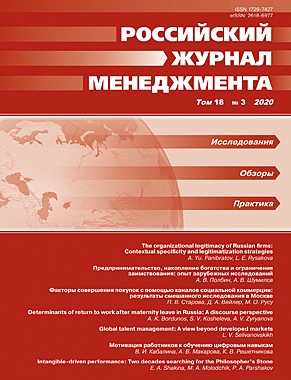Motivating employees to acquire digital skills
DOI:
https://doi.org/10.21638/spbu18.2020.306Abstract
Motivating the working population to master digital skills is an important condition for the digital transformation of the Russian economy and companies. The article examines the relationship between the general level of motivation for learning digital skills and a number of factors, assesses the average level of motivation for four groups of skills, and compares the level of motivation between groups of workers and their motives. Empirical data were obtained by conducting an online survey of the working population in March 2020, the target sample was 116 respondents. It was revealed that the general level of motivation of workers to learn decreases with the increasing complexity of digital skills. The hypotheses about the relationship between the level of motivation and the perceived difficulty of using information and communication technologies and previous learning experience were confirmed. Differences between the groups of workers in the level of motivation and the degree of mastering specialized digital skills, related to the nature of the work were revealed. A higher interest in mastering this group of skills, as well as the degree of mastering them, was demonstrated by the group of managers. The strongest motive for acquiring digital skills is the need to use them at work.
Keywords:
motivation to learn, digital skills, perceived ease of using ICT, perceived ease of learning digital skills
Downloads
References
REFERENCES IN LATIN ALPHABET
Translation of references in Russian into English
Downloads
Published
How to Cite
Issue
Section
License
Articles of the Russian Management Journal are open access distributed under the terms of the License Agreement with Saint Petersburg State University, which permits to the authors unrestricted distribution and self-archiving free of charge.





